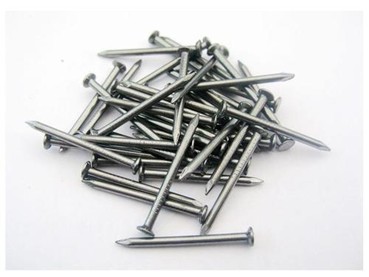Introduction
Fasteners play a crucial role in construction, carpentry, and industrial applications, providing stability and durability to structures. Among these, wire nails stand out as a popular choice for their versatility and strength. Crafted from high-quality steel, these nails are designed to offer secure fastening across a wide range of materials and projects. From furniture assembly and flooring to framing and roofing, steel fasteners ensure joints remain strong and reliable over time. Advances in manufacturing have enhanced their durability, making them resistant to corrosion and suitable for both indoor and outdoor use.
Understanding Steel Fasteners
These fasteners are produced by drawing steel into wire, cutting it to precise lengths, and shaping it with a pointed tip and flat head. Many are coated or galvanized to prevent rust, which is especially important for outdoor applications. Despite their simple design, they are engineered to deliver consistent holding power and reliable penetration.
Modern production methods include AI-based quality checks to ensure uniformity and minimize defects. This level of precision guarantees that each piece performs consistently, providing professionals and DIY enthusiasts with a dependable solution for a variety of tasks.
Common Types of Fasteners
Different steel fasteners are available to suit specific project needs:
- General-purpose nails: Suitable for everyday construction tasks such as framing, carpentry, and furniture building.
- Finishing nails: Small-headed nails are ideal for trim work and decorative projects, leaving minimal marks.
- Brads: Thin nails designed for delicate woodworking tasks that require precision.
- Concrete nails: Strong nails capable of penetrating masonry and concrete surfaces.
- Roofing nails: Broad-headed fasteners used to secure roofing materials efficiently.
Selecting the correct type ensures the stability, efficiency, and professional quality of your project. Each variant offers unique features tailored to specific applications, allowing for effective fastening regardless of material or task.
Material and Manufacturing
Steel is the most common material for these fasteners due to its strength, flexibility, and durability. The manufacturing process includes drawing the wire, cutting it to precise lengths, and shaping it with consistent heads and tips. Many nails undergo heat treatment to enhance hardness, while coatings or galvanization protect them from rust and corrosion.
AI-assisted production helps maintain uniformity, minimizing defects and ensuring every fastener meets performance standards. Modern steel fasteners are stronger and more reliable, reducing bending or breakage during use and making them a vital tool for construction and woodworking.

Applications in Construction and Woodworking
These fasteners are widely used across multiple sectors, including residential construction, furniture making, and industrial assembly. Common applications include framing wooden structures, installing flooring, assembling cabinets, securing roofing materials, and even light-duty industrial tasks.
Benefits of Using Steel Fasteners:
- Durable and long-lasting for strong joints
- Suitable for wood, metal, and masonry
- Corrosion-resistant with protective coatings
- Easy to use without specialized tools
- Cost-effective for a variety of projects
These advantages make steel fasteners a practical and preferred solution for professionals and hobbyists alike, providing strong, reliable, and efficient fastening.
Choosing the Right Fastener
Selecting the appropriate nail depends on the material, project requirements, and environmental conditions. Coated or galvanized nails are recommended for outdoor tasks to prevent rust and extend lifespan. For delicate woodworking, smaller nails minimize surface damage while still providing a secure hold.
Length and thickness are critical considerations. Longer nails increase holding power but may split the material if not pre-drilled, whereas thicker nails offer enhanced strength but leave larger impressions. Choosing the right combination ensures durability, appearance, and stability for any task.
Technological Advancements
Modern fasteners benefit from AI and automated production systems that enhance quality, efficiency, and consistency. Advanced designs now account for grip strength, load capacity, and resistance to environmental conditions. These improvements allow nails to perform reliably in both standard and demanding scenarios. AI monitoring in manufacturing reduces defects, optimizes material usage, and guarantees that each batch meets strict quality standards. Combining traditional engineering with modern technology results in fasteners that are precise, durable, and suitable for contemporary construction and woodworking projects.
Sustainable Practices
High-quality steel fasteners contribute to sustainable construction practices by reducing the need for frequent replacements. Protective coatings and galvanization extend their lifespan, particularly in outdoor applications. Using the right nails and applying them correctly supports eco-friendly construction while maintaining structural strength.
Beyond durability, modern fasteners are often manufactured using processes that minimize material waste. Advanced production techniques, including AI-assisted quality checks, ensure that each unit meets strict standards, reducing the number of defective products that might otherwise be discarded. This not only conserves raw materials but also lowers the overall environmental footprint of the manufacturing process. Additionally, by choosing long-lasting fasteners, builders and craftsmen reduce the energy and resources needed for maintenance or replacement. This contributes to more sustainable building practices and promotes the creation of structures that are not only strong but also environmentally responsible.
In combination with eco-friendly construction materials such as sustainably sourced wood or recycled metals, the use of high-quality fasteners supports green building certifications and promotes energy-efficient construction practices. Ultimately, integrating durable and reliable fasteners into projects helps reduce waste, conserve resources, and ensure that structures remain safe and functional for longer periods.
Conclusion
Wire nails remain an essential element in construction, woodworking, and industrial projects. Their durability, versatility, and cost-effectiveness make them suitable for both professional and DIY tasks. Understanding their varieties, applications, and material considerations ensures the selection of the most appropriate fastener for any project. With AI-assisted manufacturing and modern production techniques, these nails offer exceptional consistency, strength, and reliability. Whether assembling furniture, framing structures, or completing industrial tasks, steel fasteners provide the precision, durability, and efficiency needed for successful and long-lasting results.



Add Comment